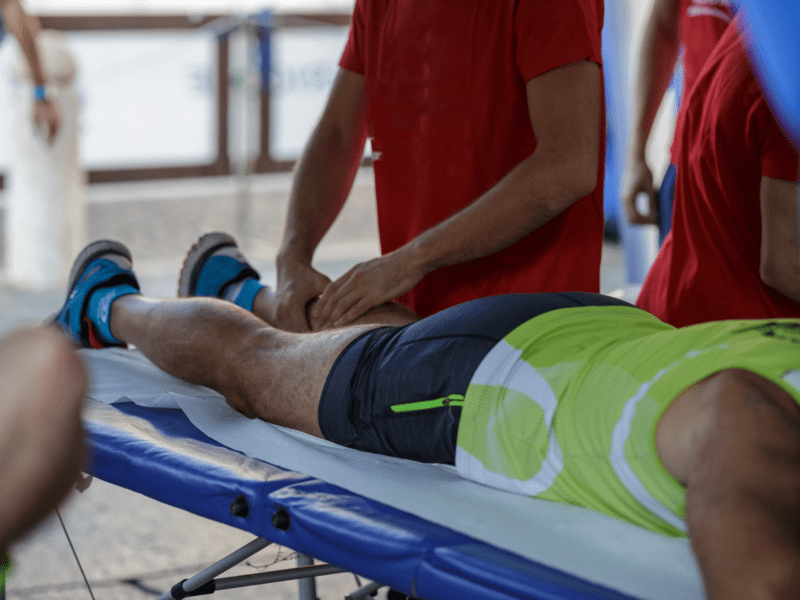What qualifications do I need to be a Physiotherapist?
Everything about the qualifications you need to become a Physiotherapist
Embarking on a career as a physiotherapist is not only a rewarding choice but also one that offers immense opportunities for personal and professional growth. As the demand for healthcare services continues to rise, physiotherapists are becoming increasingly vital in helping individuals recover from injuries, manage chronic conditions, and enhance their overall quality of life. By choosing this path, you’ll be entering a field that combines scientific knowledge with compassionate care, allowing you to make a tangible difference in people’s lives.
Physiotherapy is an ever-evolving profession that requires dedication and a commitment to lifelong learning. As you delve into this career, you’ll acquire an in-depth understanding of the human body, movement science, and therapeutic techniques. This knowledge will empower you to design personalised treatment plans tailored to each patient’s unique needs.
Moreover, the role of a physiotherapist extends beyond clinical settings; it encompasses education and advocacy for healthier lifestyles within communities. By becoming a physiotherapist, you’ll join a network of professionals who are passionate about promoting wellness and rehabilitation.
If you’re driven by the desire to help others achieve their full potential while enjoying job security and diverse work environments, then pursuing a career as a physiotherapist could be your ideal path.
In this Physiotherapist qualifications guide
Qualifications to be a Physiotherapist
Choosing a career as a physiotherapist is an excellent decision for those passionate about helping others improve their physical health and well-being. To pursue this rewarding profession in the UK, one must meet specific qualifications that ensure they are well-prepared to make a positive impact in patients’ lives.
Firstly, aspiring physiotherapists need to obtain a degree in physiotherapy from an accredited university. This typically involves completing a Bachelor of Science (BSc) degree, which provides comprehensive training in anatomy, physiology, and various therapeutic techniques. These courses are designed to equip students with the essential knowledge and practical skills required for effective patient care.
In addition to academic qualifications, it’s crucial for future physiotherapists to gain hands-on experience through clinical placements. These opportunities allow students to apply their learning in real-world settings under the supervision of experienced professionals. Such experiences not only enhance practical skills but also build confidence and competence.
Once qualified, registration with the Health and Care Professions Council (HCPC) is mandatory before practising as a physiotherapist in the UK. This ensures that practitioners adhere to strict professional standards and commit to ongoing professional development throughout their careers.
By fulfilling these qualifications, individuals can confidently step into the role of a physiotherapist, ready to make meaningful contributions to healthcare and improve patients’ quality of life through expert guidance and care.
What qualifications are needed to be a Physiotherapist?
Becoming a physiotherapist in the UK is a rewarding career choice, offering the opportunity to make a real difference in people’s lives. The journey begins with understanding the qualifications and responsibilities at each level of practice: Level 2, Level 3, and Level 4.
Level 2 Physiotherapist Qualifications
At Level 2, individuals typically start as Physiotherapy Assistants or Technicians. This role doesn’t require formal qualifications beyond GCSEs, although some employers may prefer candidates with relevant experience or SVQ in Health and Social Care. Responsibilities at this level include assisting qualified physiotherapists with patient care, setting up equipment for treatments, and maintaining accurate patient records.
Level 3 Physiotherapist Qualifications
Progressing to Level 3 involves more advanced roles such as Assistant Practitioner. At this stage, candidates often pursue further education like a BTEC National Diploma or an SVQ Level 3 in Health. Assistant Practitioners take on greater responsibilities including conducting initial assessments under supervision, implementing treatment plans designed by physiotherapists, and providing feedback on patient progress.
Level 4 Physiotherapist Qualifications
Level 4 is where you achieve full qualification as a Chartered Physiotherapist after completing an accredited degree in physiotherapy approved by the Health and Care Professions Council (HCPC). This level demands comprehensive knowledge of anatomy, physiology, and therapeutic techniques. Responsibilities include diagnosing physical problems through detailed assessments, developing personalised treatment programmes for patients across various conditions such as sports injuries or neurological disorders, and leading rehabilitation sessions.
Each level builds upon the last with increasing responsibility and expertise required. Understanding these steps not only clarifies your path but also equips you with the knowledge to excel at each stage of your professional journey into physiotherapy.

Professional bodies for a Physiotherapist
Joining a professional body is an essential step for any physiotherapist aiming to enhance their career and stay updated with the latest industry standards. These organisations not only offer valuable resources and networking opportunities but also provide a platform for continuous professional development.
One prominent association is the Chartered Society of Physiotherapy (CSP), which represents physiotherapists across the UK. Membership with CSP offers access to a wealth of resources, including research publications, training courses, and legal advice. Furthermore, being part of such a reputable body adds credibility to your professional profile.
Another key organisation is Physio First, dedicated specifically to private practitioners. This body focuses on supporting physiotherapists in private practice by offering business guidance, marketing support, and exclusive member benefits such as discounted insurance rates.
For those interested in specialising within specific areas of physiotherapy, joining specialist groups like the Acupuncture Association of Chartered Physiotherapists (AACP) or the Association of Paediatric Chartered Physiotherapists (APCP) can be incredibly beneficial. These groups provide specialised knowledge and training opportunities tailored to niche areas within the field.
Engaging with these professional bodies not only enhances your expertise but also connects you with like-minded professionals who share your passion for advancing healthcare through physiotherapy.
Training fees to become a Physiotherapist
Becoming a physiotherapist in the UK is a rewarding career path, but it’s important to be aware of the training fees associated with each level of qualification. As you progress through Level 2, Level 3, and Level 4 courses, understanding the financial commitment can help you plan effectively for your future.
Starting with Level 2, this foundational stage typically involves introductory courses that can cost anywhere from £300 to £1,000. These courses are essential as they provide the basic skills and knowledge required to advance further in your training.
Moving on to Level 3, which delves deeper into more specialised areas of physiotherapy, fees generally increase. You might expect to invest between £1,000 and £2,500 at this level. This stage is crucial as it builds on your existing knowledge and prepares you for more complex aspects of physiotherapy practice.
Finally, Level 4 represents advanced training where you’ll gain expertise in specific techniques or patient care strategies. The costs here can range from £2,500 to over £5,000 depending on the course provider and specialisation chosen. While this may seem like a significant investment upfront, it’s important to remember that reaching this level not only enhances your skills but also significantly boosts your employability and potential earnings as a qualified physiotherapist.
In conclusion, while the costs associated with becoming a physiotherapist may seem daunting at first glance, they are an investment in a fulfilling career that offers both personal satisfaction and professional growth opportunities. By planning ahead financially for each stage of your training – Level 2 through Level 4 – you can ensure you’re well-prepared for success in this vital healthcare field.

Getting experience to be a Physiotherapist
Becoming a physiotherapist is an incredibly rewarding career choice, offering the opportunity to make a real difference in people’s lives. However, gaining the necessary experience is crucial to ensure you are well-prepared for this challenging yet fulfilling profession.
Start by volunteering at local hospitals or clinics. This hands-on experience will not only enhance your understanding of patient care but also allow you to observe professional physiotherapists in action, learning valuable techniques and approaches. Additionally, shadowing experienced practitioners can provide insights into the day-to-day realities of the job and help you develop essential skills.
Another excellent way to build experience is through internships or placements during your studies. These opportunities allow you to apply theoretical knowledge in practical settings under supervision, bridging the gap between education and professional practice.
Networking with professionals in the field can also be beneficial. Attend industry conferences or join relevant associations where you can meet practising physiotherapists who might offer advice or mentorship. Their guidance can be invaluable as you navigate your path towards becoming a qualified physiotherapist.
By actively seeking out these experiences, you’ll not only bolster your CV but also gain confidence in your abilities, setting yourself up for success in this dynamic healthcare field.



